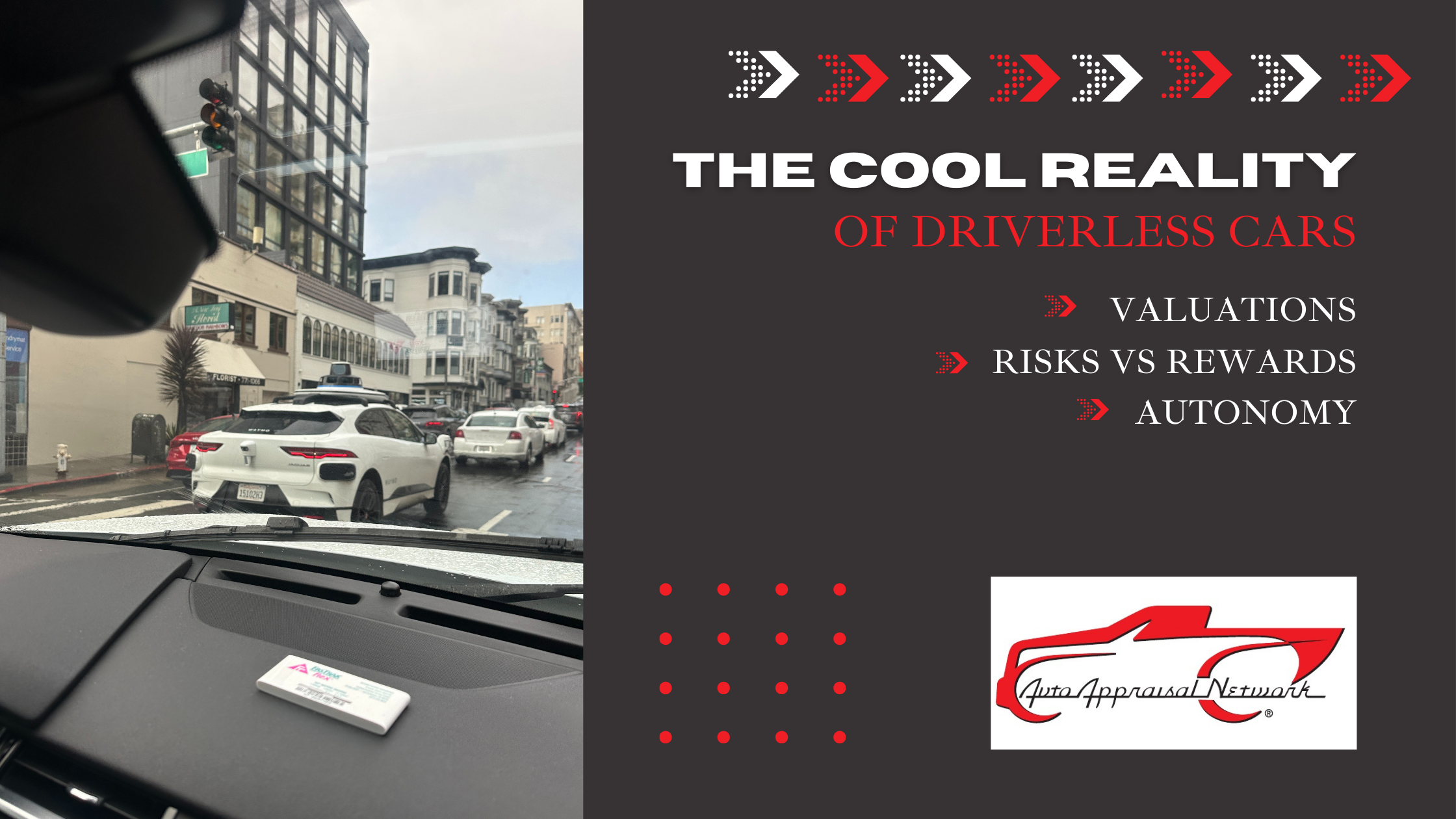Post updated April 3, 2025
The idea of a car driving itself once felt like pure sci-fi—think The Jetsons zooming around in the ‘60s or Tom Cruise dodging autonomous pods in Minority Report. For decades, it was a dream teased in magazines like Science Digest and Hollywood blockbusters. But as of 2025, that dream’s not just real—it’s parked in driveways, cruising city streets, and reshaping how we think about cars. So, would you trust a driverless car? And more importantly for us at Auto Appraisal Network: how’s this tech changing the value of the classics we love?
Where We Are in the Driverless Revolution
This isn’t “on the verge” anymore—it’s here. Tesla’s Full Self-Driving (FSD) suite is standard on new models, Waymo’s robotaxis have logged over 20 million miles in cities like Phoenix and San Francisco, and even classic car conversions are popping up with aftermarket autonomy kits. States like California and Texas have greenlit fully autonomous vehicles, while places like Detroit are testing how self-driving fleets can cut traffic snarls. By some estimates, 15% of new cars sold in 2024 had Level 3 autonomy or higher—meaning they can handle most driving without human input.
The tech’s proven itself, too. Waymo’s data shows a 70% drop in crash rates compared to human drivers in urban zones, and Tesla’s 2024 safety report claims FSD-equipped cars are 10 times less likely to wreck per mile than the national average. But it’s not all smooth sailing—more on that later.
Valuation in the Age of Autonomy
At Auto Appraisal Network® , we’ve been appraising classics for decades, and driverless tech is throwing a wrench into the game. How do you value a 1965 Mustang with a retrofitted autonomy system? Or a 2025 Tesla Model Y that’s never had a human behind the wheel? Here’s what we’re seeing:
Premium Boost: Cars with factory-installed autonomy—like Tesla’s FSD or GM’s Super Cruise—often fetch 10-15% more on resale, per Kelley Blue Book’s 2024 data. Buyers love the safety and convenience.
Classic Conundrums: Retrofitting a vintage ride with self-driving tech (think a ‘70s Camaro with an aftermarket kit) can spike its value for tech-savvy collectors—sometimes by 20-30%—but purists might balk, tanking its appeal in traditional circles.
Mileage Mystery: Autonomous miles don’t wear a car the same way human driving does. A 2025 appraisal might weigh “autonomous uptime” over raw odometer readings—less wear on brakes, more on sensors.
New Questions, Some Answers
The original driverless hype left us with big questions—seatbelts, texting, liability. In 2025, we’ve got partial answers, but the human element still keeps things messy:
Rules of the Road: In autonomous mode, you’re still buckling up—NHTSA mandates it. Texting or sipping a beer? Legal in some states (like Nevada) if the car’s fully self-driving, but don’t try it in a mixed fleet.
Who’s at Fault?: Crashes are trickier. A 2023 Cruise incident in San Francisco pinned blame on the manufacturer after a pedestrian hit, but human-driven collisions with autonomous cars often split liability. Appraisers now factor in “fault history” for self-drivers.
Value Impact: Kelley Blue Book’s 2025 guide adds an “autonomy tier” to valuations—Level 4 cars (fully self-driving in set zones) outpace Level 2 (hands-on assist) by thousands.
The wild card? Mixing human and machine drivers. As autonomy grows, some argue human driving might get phased out—driving’s a privilege, not a right, and regulators could pull it if stats keep favoring machines, although the chances of the American people allowing this to happen isn't likely anytime soon.
Risks vs. Rewards
The perks are hard to ignore. Self-driving cars slash accidents (NHTSA says 94% of crashes tie to human error), ease traffic (a 2024 MIT study showed autonomous fleets cut congestion 35% in test cities), and turn commutes into nap time or Netflix binges. For classic car owners, retrofits could mean safer road trips without losing that vintage vibe.
But the risks? Tech isn’t flawless. A Waymo car stalled mid-intersection in LA last month, and Tesla’s FSD still struggles with rural roads. Trust’s another hurdle—our appraisers hear it all the time: “I’d rather steer my ‘Cuda than let a computer do it.” And value-wise, a botched retrofit could turn a $50K classic into a $20K headache if sensors fail or purists snub it.
What’s Next for You and Your Car?
Driverless tech isn’t just cool—it’s rewriting the rules of ownership and value. If you’re eyeing a classic, think about its autonomy potential—could it boost resale or make it a niche gem? If you’re selling, highlight any self-driving features; our appraisals now flag them as a value driver. And if you’re just cruising, maybe it’s time to test a hands-off ride—safely, of course.
Got a car you’re wondering about? Drop us a line at Auto Appraisal Network. We’ll help you figure out what it’s worth in this wild, driverless world.
Auto Appraisal Network of Laguna Niguel is part of a national group of professional auto appraisers. Our appraisals are the most comprehensive and complete reports available in the industry. Our appraisers are certified and have the experience and knowledge to fairly and accurately asses the value of your vehicle.
For more information on any of the services we offer, call us today at (949) 387-7774.


 To request an appraisal, please complete the sections below:
To request an appraisal, please complete the sections below: